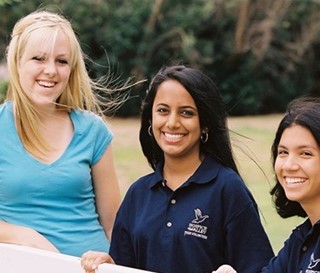Create a Successful Teen Hospice Volunteer Program

The Volunteer Management Report
Sept. 2020
by Stacia Ortega
Hospice may not seem like a natural draw for teens, but the Hospice of the Valley has found many teens are eager to help patients with end-of-life care. The program has benefited both patients and volunteers.
“When creating our teen volunteer program in 2001, a lot of people wondered, ‘Are teens going to want to do this, and are they okay emotionally to do this?’ We have found that it is actually a win-win,” says Stacia Ortega, director of volunteer and bereavement services. “It is set up as an intergenerational program where teens visit with older patients. The teens learn from someone with lots of life experience who can talk about the history teens are learning about in school. And it helps bring in a newer generation’s perspective to our older patients.”
HOV’s teen volunteer program has about 70 to 100 high school students who volunteer for two hours a week. Ortega partners with local schools to attend volunteer fairs and give presentations to healthcare-specific classes about hospice care. “We’ve been able to talk about what hospice care is, and we’ve had a really good stream of kids that want to do this program. Teens are hungry for these kinds of volunteer programs because on the medical side they’re limited due to their volunteer age group.”
Orientation and training are developed specifically for a teenager’s needs. “Teens are at a different developmental stage and have a different learning style because they’re in classrooms all day long. We created training for them that is very interactive and experiential, which has been highly effective,” Ortega adds.
Part of that training is providing the opportunity to learn about what it’s like to work with older folks. HOV brings in people of all ages to talk to the teens about their interests, their feelings and the things that are important to them. Ortega explains that sharing these experiences helps break down barriers and find commonality within the different ages. HOV also provides continuing education around topics like dementia.
One of the keys to HOV’s teen volunteer program is hiring a teen volunteer coordinator. “She understands teens developmentally. She understands how to communicate with them in a way that works with their busy schedule and the technology they use,” Ortega says.
The teen volunteer coordinator holds peer support meetings to allow teens to process any feelings or emotions, provides resources for school projects and also keeps the lanes of communication open for teen volunteers to return once they graduate.
“Many will go off to college, and we have a process for how we can move them into our adult program if they choose to stay,” says Ortega. “We engage those who come back for breaks and talk to them before they leave about their plans and, sometimes, they just call us out of the blue.”
Teens not only receive community service credit and scholarship opportunities but they also gain hands-on medical experience. Ortega explains that, unlike many hospitals, teens in a hospice can really get to the bedside of a patient, which appeals to teens looking for experience in a medical setting with patients.
